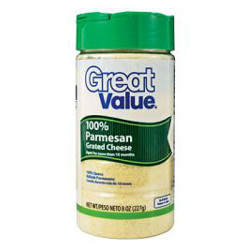Top Class Actions’s website and social media posts use affiliate links. If you make a purchase using such links, we may receive a commission, but it will not result in any additional charges to you. Please review our Affiliate Link Disclosure for more information.

The class action complaint alleges that “testing shows that at least 7% to 10% of the purportedly ‘100%’ parmesan cheese consists of cellulose, a filler and anti-clumping agent derived from wood pulp.”
According to the Wal-Mart grated parmesan cheese class action lawsuit, “Defendant makes only one marketing representation on the label: the Product is ‘100%’ Grated Parmesan Cheese.” That claim “is literally false and misleading to consumers,” the complaint continues.
The Wal-Mart grated parmesan cheese class action follows a similar case recently filed against Kraft for its parmesan cheese. The class action against Kraft also alleges that its “100% grated parmesan cheese” actually contains around 3.8% additives and fillers, such as cellulose. That class action lawsuit accuses Kraft of misleading consumers for years, including using TV advertisements to go after its competitors for their inferior fillers in their parmesan cheese.
These lawsuits arose from news reports that tested various brands of grated parmesan cheese, after the Food and Drug Administration raided a company that sold “100% grated parmesan cheese” with no actual parmesan cheese in it at all.
Bloomberg published an article on February 16, stating that the FDA found that Castle Cheese had sold grated parmesan cheese made from cellulose and cheaper cheeses such as cheddar and mozzarella. The article states that no actual parmesan was used in the brands manufactured by that company. This prompted the news site to pay for an the independent lab to test samples of some of the most popular brands of grated parmesan cheese. The Bloomberg article states that the independent lab found various levels of cellulose in every brand that was tested.
Plaintiff Marc Moschetta states that he purchased the Great Value-brand grated parmesan cheese based on its deceptive label. Moschetta claims that he “would not have purchased the product at a premium price, and/or would have paid significantly less for the product, had he known that the ‘100%’ representation is false and mischaracterizes the amount and percentage of Parmesan Cheese in the container.”
Moschetta seeks to represent a Class of all consumers who purchased Great Value grated parmesan cheese anywhere in the United States. Moschetta also requests a subclass of New York residents, based on New York state consumer protection laws.
The Wal-Mart grated parmesan cheese class action seeks monetary damages for all Class Members, and a court order “directing Defendant to correct their practices and to comply with consumer protection statutes nationwide.” The class action also asks for punitive damages because Wal-Mart “made its illegal, untrue and/or misleading statements and representations willfully, wantonly, and with reckless disregard for the truth.”
Plaintiff Marc Moschetta is represented by Jason P. Sultzer, Joseph Lipari, and Jean M. Sedlak of the Sultzer Law Group.
The Wal-Mart Grated Parmesan Cheese Class Action Lawsuit is Marc Moschetta v. Wal-Mart Stores Inc., Case No. 7:16-cv-01377, in the U.S. District Court for the Southern District of New York.
UPDATE: On June 2, 2016, The U.S. Judicial Panel on Multidistrict Litigation (JPML) has consolidated 16 class action lawsuits that allege the labeling and marketing of certain parmesan cheese products as “100% Grated Parmesan Cheese” is false and misleading because the products allegedly contain cellulose as a filler.
UPDATE 2: On Nov. 1, 2018, a federal judge determined that only some of the allegations in a Kraft, Walmart parmesan cheese multidistrict litigationwill move forward.
ATTORNEY ADVERTISING
Top Class Actions is a Proud Member of the American Bar Association
LEGAL INFORMATION IS NOT LEGAL ADVICE
Top Class Actions Legal Statement
©2008 – 2024 Top Class Actions® LLC
Various Trademarks held by their respective owners
This website is not intended for viewing or usage by European Union citizens.















101 thoughts onWal-Mart Hit With Class Action Over Wood Pulp in Parmesan Cheese
What is current status ..?
UPDATE: On June 2, 2016, The U.S. Judicial Panel on Multidistrict Litigation (JPML) has consolidated 16 class action lawsuits that allege the labeling and marketing of certain parmesan cheese products as “100% Grated Parmesan Cheese” is false and misleading because the products allegedly contain cellulose as a filler.
So, what does that mean? No one submits claims? how does this end?
TCA…how do we file on this? I have bought so much of this stuff in my life.
What is the status of this?? It’ been nearly 2 years. When will consumers be able to actually file a claim right here??
I’ve purchase many times over the years!!!
I have purchased & used those products for years. Add me to the claim please.
U know come to think of it my turds always floated better after eating this cheese!!..just chucked my container…oops good firestarter!;)